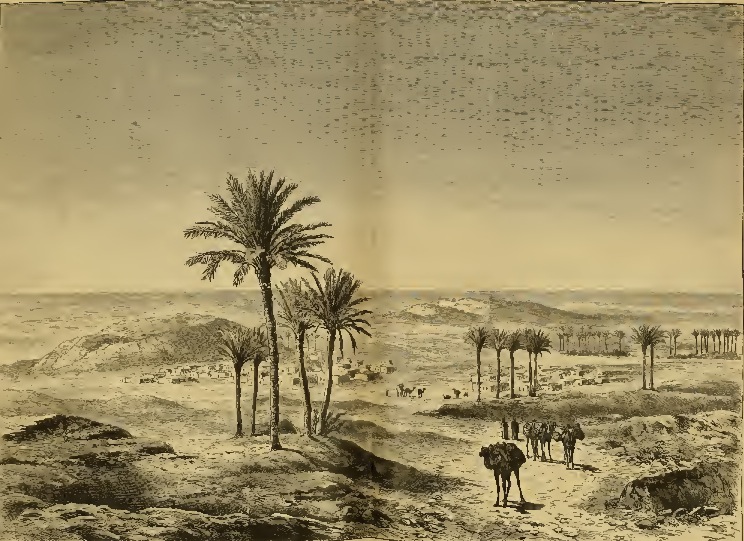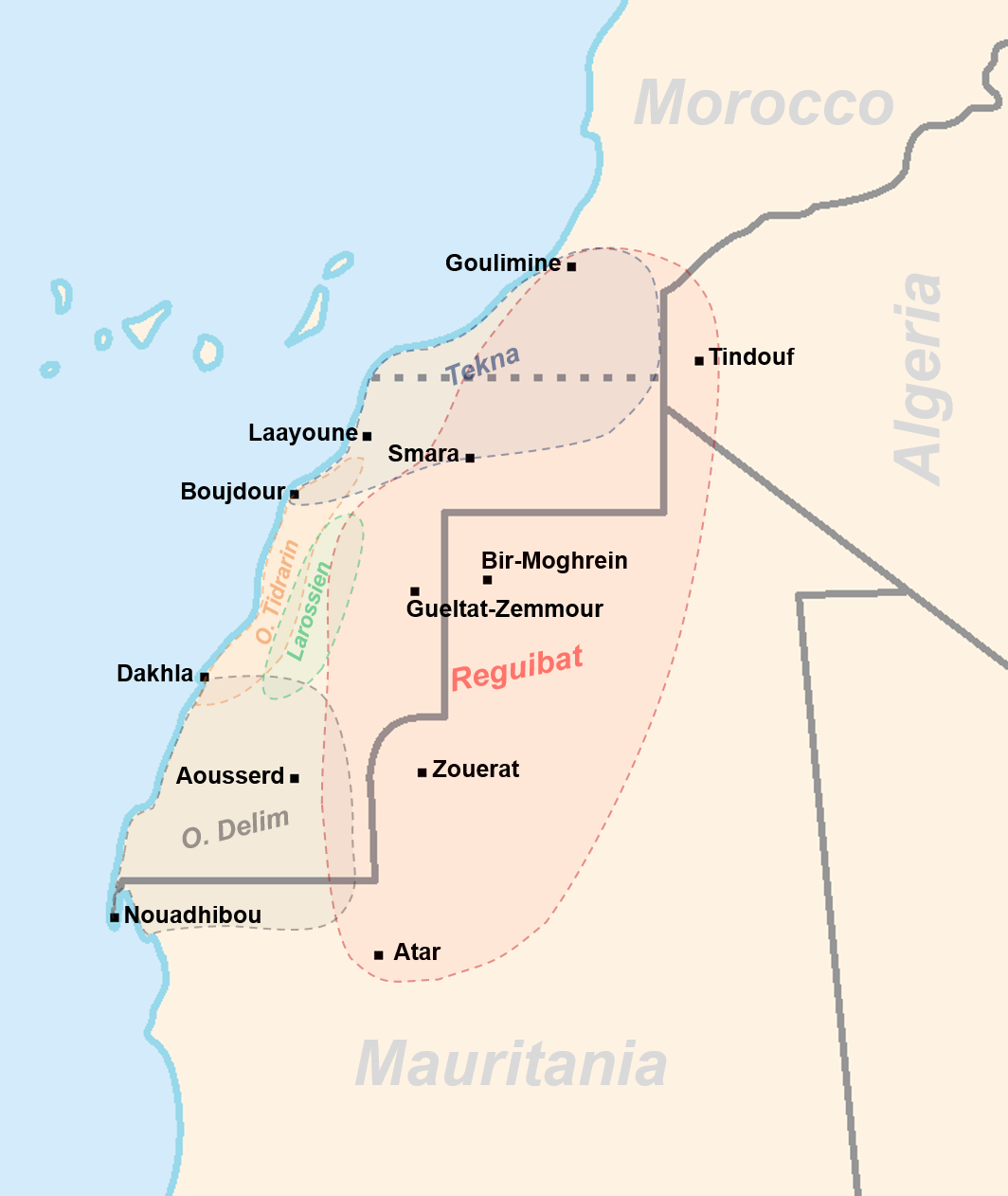|
Tajakant
The Tajakant (also Tadjakant) is a Sahrawi tribe of Berber Sanhaja origins. They speak Hassaniya Arabic. The Tajakant mainly live in Mauritania, Morocco, Western Sahara, Algeria, and Mali. They are Muslims, adhering to the Maliki school of Sunni Islam. The Tajakant tribe descended from the tribe of Lamtuna, a fraction of the powerful tribe of Sanhadja in the Mauritanian Adrar. They became sedentary during the ninth century, at the fall of the Almoravid empire and founded two cities, Tinigui and Togba, located between Chinguetti and Ouadane, but since disappeared. The Tajakant were known as traders and warriors, and held a strong position in the trans- Saharan trade between ''Belad Asudan'' (Sub-Saharan Africa) and Morocco. In 1852, Tajakant tribesmen founded a settlement and trading post in the oasis of Tindouf, in what is now Algeria. They were engaged in a lengthy war against the Reguibat and Kunta in the 19thc., their allies in this war were the Senhaja. This culminated i ... [...More Info...] [...Related Items...] OR: [Wikipedia] [Google] [Baidu] |
Tindouf
Tindouf ( Berber: Tinduf, ar, تندوف) is the main town, and a commune in Tindouf Province, Algeria, close to the Mauritanian, Western Saharan and Moroccan borders. The commune has population of around 160,000 but the census and population estimates do not count the Sahrawi refugees making the population as of the 2008 census 45,966, up from 25,266 in 1998, and an annual population growth rate of 6.3%. The region is considered of strategic significance. It houses Algerian military bases and an airport with regular flights to Algiers as well as to other domestic destinations. The settlement of Garet Djebilet lies within the municipal territory of Tindouf near the border with Mauritania; the settlement has an iron mine and a defunct airport, and is approximately northwest of Âouinet Bel Egrâ. Since 1975, it also contains several Sahrawi refugee camps operated by the Polisario Front, a national liberation movement seeking the self-determination of Western Sahara. Histo ... [...More Info...] [...Related Items...] OR: [Wikipedia] [Google] [Baidu] |
Reguibat Tribe
The Reguibat ( ar, الرقيبات; variously transliterated ''Reguibate'', ''Rguibat'', ''R'gaybat'', ''R'gibat'', ''Erguibat'', ''Ergaybat'') is a Sahrawi tribe of Sanhaja- Berber origins. The Reguibat speak Hassaniya Arabic, and are Arabized in culture. They claim descent from Sidi Ahmed Rguibi, who lived in the Saguia el-Hamra region in the 16th century. They also believe that they are, through him, a chorfa tribe, i.e. descendants of Muhammad. Religiously, they belong to the Maliki school of Sunni Islam. History Initially an important Arabic zawiya or religious tribe with a semi-sedentary lifestyle, the Reguibat gradually turned during the 18th century towards camel-rearing, raiding and nomadism, in response attacks from neighbouring tribes which provoked them into taking up arms and leaving the subordinate position they had previously held. This started a process of rapid expansion, and set the Reguibat on the course towards total transformation into a traditiona ... [...More Info...] [...Related Items...] OR: [Wikipedia] [Google] [Baidu] |
Lamtuna
The Lamtuna (Berber: Ilemteyen) are a nomadic Berber tribe belonging to the Iẓnagen / Sanhaja (Zenaga) confederation, who traditionally inhabited areas from Sous to Adrar Plateau. During the Almoravid period, many Lamtunas emigrated northwards. Currently, the Lemtuna Tribe is based in the South of Mauritania (Monguel and Agueilat). The chief of this Tribe is Mr. Limam Ould Teguedi (former Minister of Justice, former Minister of culture and former Attorney General of Mauritania. Among notable families, the family of Ehl Aly Ibn Ibrahim and the family of Ehel Sidelemine , Ehl Abdawa, Ehl Mohamed El-Emine, Ehl Mohammed Ghali. Sahrawi Tajakant as well as Messouma tribes are of the most recognisable offshoots of the Lamtunas. They inhabit the area between Morocco and Western Sahara. The Banu Ghaniya, the successors of this dynasty in Tripoli and the Nafusa Mountains and the governors of the Spanish Balearic Islands until about the middle of the 13th century, originated from this tri ... [...More Info...] [...Related Items...] OR: [Wikipedia] [Google] [Baidu] |
Sahrawi People
The Sahrawi, or Saharawi people ( ar, صحراويون '; es, Saharaui), are an ethnic group and nation native to the western part of the Sahara desert, which includes the Western Sahara, southern Morocco, much of Mauritania, and along the southwestern border of Algeria. They are of mixed Berber, Arab and Black African descent. As with most peoples living in the Sahara, the Sahrawi culture is a mix of Arab and indigenous African elements. The modern Sahrawi culture consists of a Berber core and considerable Arab influences. Sahrawis are composed of many tribes and are largely speakers of the Hassaniya dialect of Arabic. Etymology The Arabic word ' literally means "Inhabitant of the Desert". The word Sahrawi is derived from the Arabic word ' (), meaning desert. A man is called a "Sahrawi", and a woman is called a "Sahrawiya". In other languages it is pronounced in similar or different ways: * Berber: ''Aseḥrawi'' or ''Aneẓrofan'' * English: ''Sahrawi'' or ''Sahar ... [...More Info...] [...Related Items...] OR: [Wikipedia] [Google] [Baidu] |
Ouadane
, settlement_type = Commune and town , image_skyline = OuadaneOldTown1.jpg , imagesize = , image_caption = Old tower, Ouadane , image_flag = , image_seal = , image_map = , map_caption = , pushpin_map = Mauritania , pushpin_label_position = bottom , pushpin_mapsize = , pushpin_map_caption = Location in Mauritania , subdivision_type = Country , subdivision_type1 = Region , subdivision_name = Mauritania , subdivision_name1 = Adrar Region , subdivision_type2 = , subdivision_name2 = , established_title = , established_date = , government_type = , leader_title = , leader_name ... [...More Info...] [...Related Items...] OR: [Wikipedia] [Google] [Baidu] |
Berber Peoples And Tribes
Berber or Berbers may refer to: Ethnic group * Berbers, an ethnic group native to Northern Africa * Berber languages, a family of Afro-Asiatic languages Places * Berber, Sudan, a town on the Nile People with the surname * Ady Berber (1913–1966), Austrian film actor * Alejandro Berber (born 1987), Mexican footballer * Anita Berber (1899–1928), German dancer, actress, and writer * Fatiha Berber (1945–2015), Algerian actress * Felix Berber (1871–1930), German violinist * Fritz Berber (1898–1984), member of the Nazi administration in Germany until 1943 * Kübra Berber (born 1996), Turkish women's footballer * Mersad Berber (1940–2012), Bosnian painter * Oğuzhan Berber (born 1992), Turkish footballer * Philip Berber (born 1958), Irish American entrepreneur and philanthropist * Yolande Berbers, Belgian computer scientist * , born 1987), Russian actress Other uses * Berber carpet, a type of carpet hand-woven by the Berber autochthones in North Africa and the Sahara * B ... [...More Info...] [...Related Items...] OR: [Wikipedia] [Google] [Baidu] |
Arabized Berbers
Arabization or Arabisation ( ar, تعريب, ') describes both the process of growing Arab influence on non-Arab populations, causing a language shift by the latter's gradual adoption of the Arabic language and incorporation of Arab culture, after the Muslim conquest of the Middle East and North Africa, as well as the Arab nationalist policies of some governments in modern Arab states toward non-Arabic speaking minorities, including Algeria, Iraq, Kuwait, Sudan. Historically, aspects of the culture of the Arabian Peninsula were combined in various forms with the cultures of conquered regions and ultimately denominated "Arab". After the rise of Islam in the Hejaz, Arab culture and language were spread outside the Arabian Peninsula through conquest, trade and intermarriages between members of the non-Arab local population and the peninsular Arabs. Even within the Arabian Peninsula itself, Arabization occurred to non-Arab populations such as the Hutaym in the northwestern Ar ... [...More Info...] [...Related Items...] OR: [Wikipedia] [Google] [Baidu] |
List Of Sahrawi Tribes
This category is for tribes of the Sahrawi people. Tribes The term tribe is used in many different contexts to refer to a category of human social group. The predominant worldwide usage of the term in English is in the discipline of anthropology. This definition is contested, in part due to conflic ... Tribes of Africa ... [...More Info...] [...Related Items...] OR: [Wikipedia] [Google] [Baidu] |
Polisario Front
The Polisario Front, Frente Polisario, Frelisario or simply Polisario, from the Spanish abbreviation of (Popular Front for the Liberation of Saguia el-Hamra and Río de Oro), (in ar, rtl=yes, الجبهة الشعبية لتحرير الساقية الحمراء ووادي الذهب, al-Jabhah al-Shaʿbiyah Li-Taḥrīr as-Sāqiyah al-Ḥamrāʾ wa Wādī al-Dhahab), is a rebel Sahrawi nationalist liberation movement claiming Western Sahara. Tracing its origin to a Sahrawi nationalist organization known as the Movement for the Liberation of Saguia el Hamra and Wadi el Dhahab, the Polisario Front was formally constituted in 1973 with the intention of launching an armed struggle against the Spanish occupation which lasted until 1975, when the Spanish decided to allow Mauritania and Morocco to partition and occupy the territory. The Polisario Front waged a war to drive out the two armies. It forced Mauritania to relinquish its claim over Western Sahara in 1979 and continu ... [...More Info...] [...Related Items...] OR: [Wikipedia] [Google] [Baidu] |
Djema'a
The term Djema'a (or Djemaa, meaning "Congregation" or "Gathering" in Arabic) can refer to two things in a Western Sahara context. Djema'a: tribal leadership The Djema'a was the leading body in a Sahrawi tribe, composed of elders and elected leaders. It organized war efforts, raiding parties, lawmaking and diplomacy, among other things, and also settled disputes between members of the tribe. Sometimes, a larger assembly known as the Ait Arbein (Council of Forty) would be gathered, composed of elders from several tribes, to organize the community against foreign invasion or other such supratribal concerns. The exact organization of the Djema'a varied from tribe to tribe, but it generally incorporated both old Berber customs, Arab traditions and based its practices on Islamic law. Women served on the Djema'a in at least some of the Sahrawi tribes. Decline An enduring social structure, tribalism had ruled the Sahrawis since they first appeared in the area in the Middle Ages, but ... [...More Info...] [...Related Items...] OR: [Wikipedia] [Google] [Baidu] |
Moors
The term Moor, derived from the ancient Mauri, is an exonym first used by Christian Europeans to designate the Muslim inhabitants of the Maghreb, the Iberian Peninsula, Sicily and Malta during the Middle Ages. Moors are not a distinct or self-defined people. The 1911 ''Encyclopædia Britannica'' observed that the term had "no real ethnological value." Europeans of the Middle Ages and the early modern period variously applied the name to Arabs and North African Berbers, as well as Muslim Europeans. The term has also been used in Europe in a broader, somewhat derogatory sense to refer to Muslims in general,Menocal, María Rosa (2002). ''Ornament of the World: How Muslims, Jews and Christians Created a Culture of Tolerance in Medieval Spain''. Little, Brown, & Co. , p. 241 especially those of Arab or Berber descent, whether living in Spain or North Africa. During the colonial era, the Portuguese introduced the names " Ceylon Moors" and "Indian Moors" in South Asia and Sri ... [...More Info...] [...Related Items...] OR: [Wikipedia] [Google] [Baidu] |
Kunta (tribe)
The Kountas or Kuntas (singular: ''Elkentawi'' or ''Alkanata'') are described originally as Arabs, descendants of Uqba ibn Nafi,. The Kunta tribe are also considered to have roots to Sidi Ahmad al-Bakkay, the founder, who died in the early 16th century. The Kunta originated in Qayrawan. The Kunta was formed during the 9th/15th or possibly during the 10th/16th century. They were located in the north-west side of Shara. The Kounta were instrumental in the expansion of Islam into sub-Saharan West Africa in the 15th century, and formed an urban elite in cities such as Timbuktu which were on the southern end of the Trans-Saharan trade. The Kunta are better known for their role as Islamic scholars. From Timbuktu, the Kunta were able to exert an enormous influence on the development of Islam in West Africa. They established different clerical identity. They as well did not use weapons when spreading the word of Islam. They are a large religious clan whose relations are the product of s ... [...More Info...] [...Related Items...] OR: [Wikipedia] [Google] [Baidu] |


.jpg)

